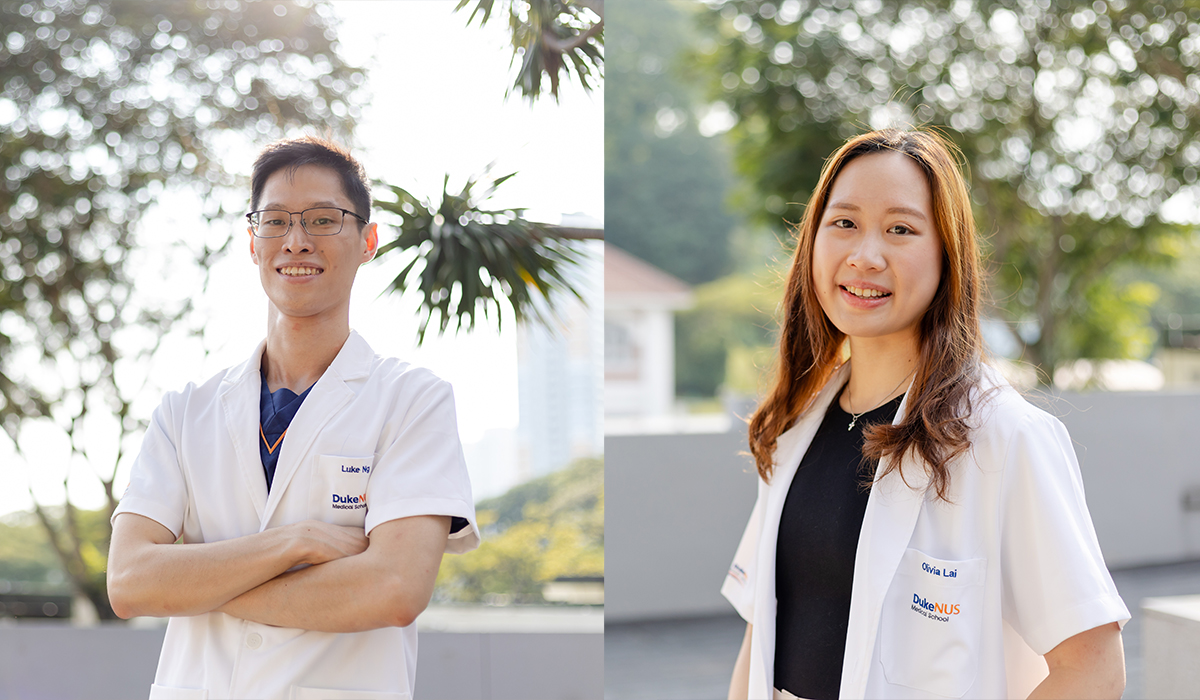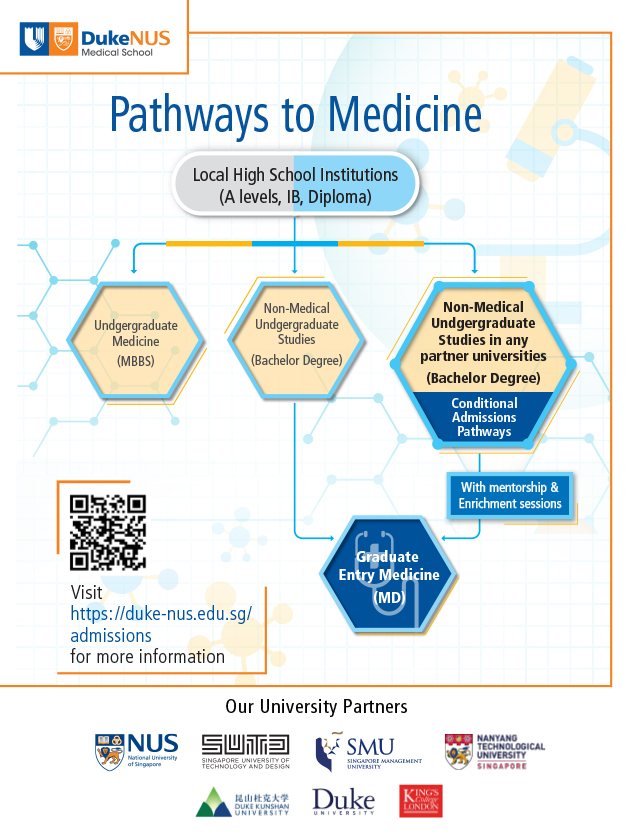Left: Ng Yong Zhi was awarded the Goh Foundation Scholarship and was able to pursue a Bachelor of Science in Biological Sciences at NTU. Today, he is a Doctor of Medicine Candidate at Duke-NUS Medical School.
Right: Olivia Lai Si En is currently a Doctor of Medicine candidate at Duke-NUS Medical School. She was admitted through the SMU-Duke-NUS Pathway. Prior to this, she received a Bachelor of Laws at SMU.
Duke-NUS Medical School, a collaboration between Duke University in the United States and the National University of Singapore, serves as a distinguished leader in the medical education and research. Driven by a resolute commitment to shaping the future of healthcare and advancing the frontiers of biomedical knowledge, Duke-NUS has established itself as a catalyst for medical innovation, a bastion of clinical excellence, and a crucible of scientific advancement.
In the heart of this dynamic institution, Olivia Lai Si En and Ng Yong Zhi, both Doctor of Medicine (MD) candidates, are poised to leave their indelible mark on countless lives. Their journeys personify the institution’s core mission of elevating healthcare standards and pushing the boundaries of medical understanding. Yong Zhi took a direct path to the MD course with a Bachelor’s in Biological Sciences from NTU. On the other hand, Olivia, armed with a Bachelor of Laws from SMU, undertook the transformative transition to medicine through the pioneering SMU Conditional Admissions (CA) Pathway.
This unique pathway offers students the invaluable opportunity to explore a diverse array of academic interests while remaining intricately connected to the world of medicine at Duke-NUS. It empowers them to bring fresh perspectives and apply their diverse skill sets in the field of medicine.
We sat down with them both to learn more about their respective academic pathways and career goals.
Yong Zhi, what sparked your interest in medicine?
During my undergraduate years, I developed a keen interest in the field of microbiome, especially the interplay between the gut microbiome and neurodegenerative diseases. I was fascinated by the complexity of the interactions between the microbes in our gut and us, and the wide range of human diseases associated with when these interactions become dysfunctional. In addition, Singapore has a unique landscape for microbiome research, comprising a heterogeneous multi-racial society sprinkled with Western influence on our diet. I had thus sought related research experiences both in the wet lab and dry lab throughout my undergraduate years.
Towards graduation, I realised that while research is enjoyable, I would like to make a more tangible impact on the lives of others. Furthermore, it lacks opportunities for fulfilling human touch and interaction. Together with Duke-NUS’ focus on developing clinician-scientists, it was a very straightforward choice to apply to study medicine at Duke-NUS to have the best of both worlds.
Olivia, what made you embark on the SMU-Duke-NUS Pathway?
The SMU-Duke-NUS Pathway embodies Duke-NUS’s clinician plus model, which aims to develop future clinicians who can contribute to Singapore’s healthcare ecosystem by having a deeper understanding of its complex operations and patient-centric processes.
As all students at SMU are guaranteed a second major, I took the chance to major in Health Economics and Management, which included courses that were co-taught by SingHealth. This opened my eyes to hospital administration, healthcare financing and the intricacies of Singapore’s healthcare system. What I enjoyed the most during this second major was the SingHealth executives sharing their experiences in tackling problems in hospital administration, especially during the COVID-19 global pandemic.
The intersection between law and medicine is an interesting one – medico-legal issues, ethics and medical policy, etcetera. An example that comes to mind is a project that I worked on during my time in SMU Law called Project Ageing by SMU Pro Bono Centre. It aimed to produce a series of videos to bring awareness to matters relating to mental incapacity and the legal instruments that can aid caregivers in providing better care for their loved ones and patients. It was especially helpful in preparing their families for the time they would no longer be able to make decisions for themselves. That was an eye-opening experience for me.
That’s amazing! How different were the undergraduate and MD pedagogies?
Olivia: Duke-NUS’s pedagogy is unique because our lessons are taught using the TeamLEAD framework. This learning pedagogy allows students to learn collaboratively through practical problem-solving and small group discussions. TeamLEAD also allows us to have constant interaction and feedback with content experts and faculty members that help keep our sessions engaging and productive.
What I appreciate about Duke-NUS is the emphasis on team-based learning. We work in our teams in class discussions, labs, clinical skills and more, allowing us to form close bonds with our teammates. As the MD course is a vigorous one, having a supportive environment in school is important.
Yong Zhi: The MD pedagogy at DukeNUS is very different from my undergraduate experiences, which still largely followed the lecture-tutorial format. The Team-Based Learning (TBL) at Duke-NUS allows us to learn from both faculty and our classmates, which is an invaluable experience, given that the students at DukeNUS come from a wide range of backgrounds. Articulating my ideas and understanding of a subject during TBL helped to solidify concepts and identify gaps in my understanding.
Fascinating! Can you tell us more about how you prepared yourselves for the MD programme?
Olivia: Students in the Conditional Admissions Pathway have a clinician mentor during their undergraduate years. My clinician mentor, who is a clinical professor at Duke-NUS, shared valuable life and career advice with me. He also helped me stay in touch with the latest updates in Singapore’s healthcare scene.
I also appreciate the admissions team from Duke-NUS who have been extremely helpful and supportive to the students. Apart from responding to many of our queries, they have also helped to arrange classes that prepared us for our MCATs and facilitated talks with clinicians. The close partnership that Duke-NUS builds with their Conditional Admissions students helps to prepare them to enter medicine even during their undergraduate years.
Yong Zhi: While having a background in biological sciences helped in the transition to the MD programme, what helped me the most was the routines and studying habits that I developed during my undergraduate years. The MD curriculum requires both breadth and depth in medical knowledge, which is daunting, and one may get easily lost in the amount of content. Being able to fall back on studying habits and further refine them to suit the MD curriculum helped me to balance school, family time and my interests.
Finally, which traits do you think are most important when coming into the MD programme?
Olivia: Having resilience and a growth mindset is extremely important for the MD programme. The medical journey is a challenging one and there will be ups and downs. We need to pick ourselves up from our lows so that we can experience the highs. The learning curve is steep, and it is important to be kind to yourself - everyone is here for a reason. While working hard is important, it is also important to let ourselves rest and recharge by sleeping enough and doing things that we enjoy. We must first look after ourselves to ensure that we can look after our patients well.
Yong Zhi: Having the curiosity to learn and attitude to improve. The breadth of medicine means that there is an interest for everyone, hence, it is important to explore and find your own niche. Medicine also extends beyond the textbook, where being able to build rapport with patients is an art in itself. Building up communication skills is a lifelong process and improvement does not happen overnight. It is important to have a positive learning attitude and embrace the challenges that are to come in medical school.



